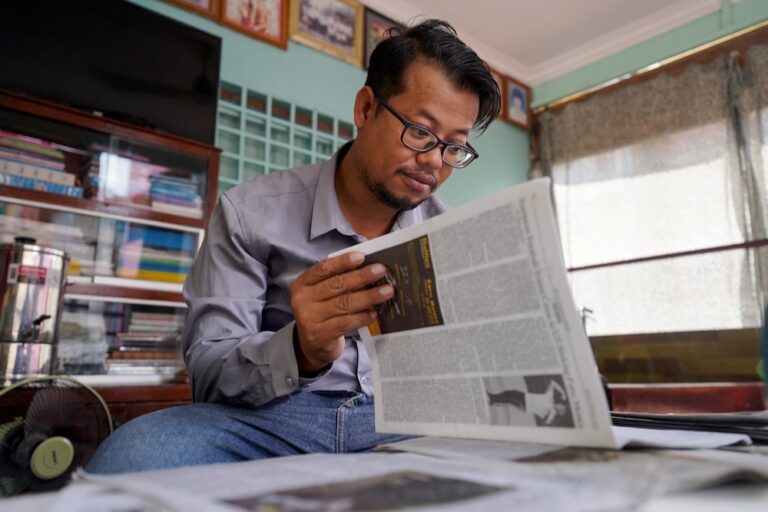The proposed LANGO has been passed by the Cambodian National Assembly with minor amendments and approved by the Senate without any further discussion on the important concerns that civil society groups have raised.
On 30 July 2015, civil society organisations addressed an open letter to His Majesty King Norodom Sihamoni, urging him not to sign the proposed LANGO [Law on Associations and Non-Governmental Organizations].
The proposed LANGO has been passed by the National Assembly with minor amendments and approved by the Senate on 24 July 2015 without any further discussion on the important concerns that we have raised. If promulgated, the LANGO will lead to serious restrictions of the rights to freedom of association, expression and assembly and the right to participate in public life, including by expressing dissent, in clear violation of what is established in the Cambodian Constitution and and Cambodia’s international legal obligations. The proposed law, which was never publicly and officially circulated, is now to be reportedly scrutinized by the Constitutional Council.
This letter was translated from the Khmer Official Letter.
His Majesty King Norodom Sihamoni
Kingdom of Cambodia
Phnom Penh, 30 July 2015
Civil Society Organizations urge His Majesty the King not to sign the LANGO
Your Highness,
We, the undersigned civil society organizations, are writing to urge your Majesty not to sign the proposed Law on Associations and Non-Governmental Organizations (“LANGO”), and to call for your urgent intervention as the official guarantor of the constitutional rights and freedoms of all Cambodians, and of the international human rights treaties to which Cambodia is a party.
Already, several hundred civil society organizations, the UN Office of the High Commissioner for Human Rights, various UN experts, the European Union and several diplomatic delegations in Cambodia have voiced their deep concern regarding the LANGO. During the “National
Workshop on Understanding the LANGO” held on 8 July 2015, Cambodian civil society and other international stakeholders once again called for meaningful consultations, clarifications and amendments to the law. None of these calls have been listened to or given meaningful
consideration, and the legislative process remained characterized by secrecy and a lack of transparency throughout.
Since Prime Minister Hun Sen’s announcement in April 2015 to resume the adoption process of the LANGO, numerous analyses of the draft law have been provided to lawmakers, highlighting specific provisions that contravene our Constitution and international law. We, along with many other groups, have suggested changes to the draft which would bring it into line with its purported goal of protecting the right to freedom of association and promoting cooperation between civil society and the government.
The proposed LANGO was passed by the National Assembly on 13 July 2015 with minor amendments and approved by the Senate on 24 July 2015 without any further discussion on the important concerns that we have raised. This proposed law violates international human rights standards and Cambodia’s international legal obligations. The text contains deeply worrisome provisions with regard to the imposition of mandatory registration for all domestic and foreign associations and NGOs, as well as onerous registration requirements, reporting obligations and broad and vague grounds for denial of registration and deregistration. Every association and NGO will be subject to the threat of being arbitrarily shut down due to non-compliance with broadly-worded criteria, such as: political neutrality; conducting activities deemed adverse to public security, peace, stability and public order; or harming national security, national unity, culture, and traditions. In addition, small community-based organizations will be likely prevented from acting without previous registration, thereby seriously impairing their capacity to exercise their fundamental freedoms.
This law confers broad and intrusive powers upon the government that go beyond the permissible limitations allowed by international human rights law and would severely undermine the capacity of civil society organizations to operate in Cambodia. If promulgated,
the LANGO will lead to serious restrictions of the rights to freedom of association, expression and assembly and the right to participate in public life, including by expressing dissent, in clear violation of what is established in the Cambodian Constitution and the International Covenant on Civil and Political Rights.
Your Majesty, this law goes to the detriment of Cambodian people and the international credibility of this country. We request you to exercise your constitutional role as guarantor of the constitutional rights and freedoms of all Cambodians, and of the international human rights treaties to which Cambodia is a party, and not to sign the Royal proclamation promulgating this law.
Yours sincerely,
1. Banteay Srei
2. Cambodian Center for Human Rights (CCHR)
3. Cambodian Human Rights Action Committee (CHRAC)
4. Cambodian Human Rights and Development Association (ADHOC)
5. Cambodian Labour Confederation (CLC)
6. Coalition of Cambodian farmer Community(CCFC)
7. Community Legal Education Center (CLEC)
8. Cambodian Center for Independent Media (CCIM)
9. Cambodian Food and Service Workers’ Federation (CFSWF)
10. Cambodian Alliance Trade Union (CATU)
11. Cambodian Youth Network (CYN)
12. Caram Cambodia (CC)
13. Committee for Free and Fair Election in Cambodia (COMFREL)
14. Coalition for Integrity and Social Accountability (CISA)
15. Equitable Cambodia (EC)
16. Gender and Development for Cambodia (GADC)
17. Housing Rights Task Force (HRTF)
18. Independent Democracy Of Informal Economic Association (IDEA)
19. INDRADEVI ASSOCIATION (IDA)
20. Khmer Youth Association (KYA)
21. Legal Aid of Cambodia (LAC)
22. People Center for Development and Peace (PCDP)
23. Samakum Teang Tnaut (STT)
24. Strey Khmer Organization
25. Social Dhamma Dana Organization (SDDO)
26. The Alliance for Conflict Transformation (ACT)

Excerpt of a CCHR timeline detailing the process that led to the adoption of the LANGOCambodian Center for Human Rights (CCHR)



